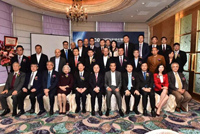The Center for China and Globalization (CCG) launched its Hong Kong Council on Nov. 12, 2017. Mr. Leung Chun-ying, the vice chairman of the CPPCC and former Chief Executive of the Hong Kong SAR, addressed the ceremony. Tung Chee-hwa, the vice Chairman of the CPPCC and the first Chief Executive of the Hong Kong SAR, sent a letter to congratulate the event.
In addition, over 40 distinguished guests from Hong Kong’s policy and business communities as well as members of executive committee of the CCG Advisory Council attended the meeting, including: former Financial Secretary of the Hong Kong SAR and Chairman of the Nan Fung Group Antony Leung Kam-chung; the First Secretary for Justice of the Hong Kong SAR and former Deputy Director of HKSAR Basic Law Committee Elsie Leung; Chairman of the Hang Lung Properties Ronnie Chan; former Chairman of the State-owned Assets Supervision and Administration of the State Council (SASAC) Li Rongrong; Chairman and CEO of CITIC Capital Zhang Yichen; CCG President and Vice President of Western Returned Scholars Association (WRSA) Wang Huiyao.
CCG Hong Kong Council is established to unit local academic, business and policymaking forces in Hong Kong to promote its role in the Chinese policy initiatives, such as the “Belt and Road”, the “Guangdong-Hong Kong-Macau Greater Bay Area,” the internationalization of the Renminbi, China’s global talent acquisition, and China’s soft power expansion.
Supported by Hong Kong’s elites from all circles, CCG Hong Kong Council is set to leverage the thought leadership of Hong Kong as well as CCG’s capabilities to influence policy and public opinion at home and abroad. The goal is to advice the SAR and central governments on the policies regarding Hong Kong’s role in the regional integration and global governance.
At the 19th CPC National Congress, President Xi Jinping reaffirmed that policy priority for the development of the Guangdong-Hong Kong-Macau Greater Bay Area and regional cooperation in the pan-Pearl River Delta. As China enters into the next phase of economic globalization, Hong Kong is geared to develop a more vibrant and competitive economy linked to the mainland and the rest of the world. It is vital to build a world-class think tank dedicated to the study of the opportunities and challenges facing Hong Kong at the critical juncture of its development.
Mr. Leung Chun-ying said in his address, “Hong Kong has historically served as a bridge between China and the outside world, and a “super-connector” between the east and west. Today, we hope it will continue with its role as the hub of information exchanges for China’s Belt and Road and the Guangdong-Hong Kong-Macau Greater Bay Area programs. The founding of the CCG Hong Kong Council is a timely and welcome act marshaling the intellectual arsenal for Hong Kong to play the role of “super-connector” in the Greater Bay Area initiative.”
He further pointed out, “CCG Hong Kong Council is the region’s first think tank focused on Hong Kong and its role in globalization. The Hong Kong Council is poised to increase the nation’s prospects for leading economic globalization, thanks to Hong Kong’s unique position.” CCG will become a major intellectual force accelerating Hong Kong’s integration into the Greater Bay and the Belt and Road initiatives, he believes.
Mr. Tung Chee-hwa said in his letter, “President Xi Jinping has repeatedly emphasized the importance of building new types of think tank with Chinese characteristics. Think tanks form a significant force of a nation’s soft power. CCG, as a leading think tank in international affairs whose public policy research and policy recommendations have been well recognized by the international community and the Chinese government. The establishment of CCG Hong Kong Council will play a positive role in fostering a deeper level of integration between Guangdong, Hong Kong, and Macau; strengthening exchange and cooperation among the three on governance, corporate, and financial affairs; and creating new engines for economic growth.” He looks forward to CCG Hong Kong Council’s success in building an intellectual platform unifying the elites in Hong Kong and the mainland.
Mr. Ronnie Chan, CCG Co-chair and Chairman of the Hang Lung Properties, said at the ceremony that since its founding in 2008, CCG has grown into one of China’s best think tanks focused on the globalization of Chinese enterprises and other issues crucial to China’s globalization strategies. He spoke highly of CCG’s prospects of becoming China’s first home-grown world-class think tank.
CCG President Dr. Wang Huiyao pointed out that Hong Kong is a right place at a right time to foster globally-oriented think tanks. At present, CCG Hong Kong Council is building up its research capacity in the fields such as Hong Kong’s role in the Belt and Road initiative, policy collaboration and investment opportunities in the Guangdong-Hong Kong-Macau Greater Bay Area, internationalization of the Renminbi, Hong Kong’s talent acquisition strategy, etc. In the meantime, CCG Hong Kong Council aims to raise the profile of Hong Kong through a series of events such as the annual Hong Kong Forum, Forum on Guangdong-Hong Kong-Macau Greater Bay Area and Globalization, seminars and symposiums on globalization studies, bi-monthly luncheons, premier fundraising events for charity and philanthropy, and so on.
Mr. Zhang Yichen, CCG Senior Vice Chair, Chairman and CEO of CITIC Capital, applauded CCG’s endeavors to promote China’s greater role in global affairs. He believes the CCG Hong Kong Council will be well-positioned to help Hong Kong realize the development initiatives such as the Belt and Road strategy.




Leave A Comment